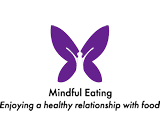Mindful Eating: Enjoy a Healthy Relationship with Food

If you want to transform your eating habits and relationship with food, my Mindful Eating service can help you to do that.
- Are you battling with mindless eating or binge eating?
- Would you like to fix your relationship with food, but don't know where to start?
- Do you enjoy healthy foods but find it hard to eat in a balanced, consistent way?
- Are you done with dieting, and in need of a fresh approach for real, lasting change?
- Are you overwhelmed with or confused about all the nutritional information and diet advice out there, and wanting some clear, common sense advice?
- Are you ready to do the mindset work that diet plans haven't taught you, and discard any unhelpful beliefs, attitudes and behaviours around eating, nutrition and weight loss that have been keeping you stuck, so that you can start eating normally without guilt, food rules and calorie counting?
Start Changing The Way You Think About Food And Transform Your Eating Habits
“I find myself, yet again, looking to join my usual weight loss club. I know my diet club food plan doesn’t suit me, though if I stick to it rigidly (and unhappily), I will lose weight. I think the time is right to explore different options.”
If you’ve tried all the diets and always end up back where you started, or you feel like you need to fix your relationship with food, there is a solution that will help you to transform your eating habits and enable you to confidently let go of calorie counting, food guilt and diet rules.
The reason many diet plans are hard to stick to isn’t just due to lack of willpower- it’s because they’re often restrictive, one size doesn’t fit all, and when you combine this with an impatience for quick results as well as lack of knowledge of mindful eating, emotional eating and nutrition, many diet plans inevitably don’t work.
The Problem With A Weight Loss Solution Only
It’s Not Your Fault You Find It Hard To Stick To A Diet
Many people feel a lot of guilt and shame around their eating, but in many cases it’s not simply about giving in to the diet or being greedy. Each person has their own unique history, past experiences and lifestyle, which are key factors when exploring a person’s eating habits and relationship with food. Therefore it’s really important to look at the ‘whole picture’. This includes exploring their:-
~ Eating habits
~ Lifestyle, including stress levels and sleep patterns
~ Mental health and general well-being
~ Physical health
~ Self-esteem / self-concept
~ Past experiences /childhood
~ History of dieting
~ Personality
~ Life satisfaction
My Three-Pronged Strategy
I encourage clients to explore three areas in relation to their eating habits and relationship with food, to provide a more effective outcome:-
1. Mindless habits: teaching mindful eating concepts and practises
2. Emotional eating: helping a person to understand and address why they might use food as a coping mechanism
3. Nutrition and physiology: improving the client’s knowledge about key biological processes which play a crucial role in weight management potential, happiness levels, motivation levels, energy levels and general health and well-being, which in turn influences how, what and why we eat. These include insulin, cortisol, appetite hormones and sex hormones. It can really help to incentivise an individual to make more helpful food choices once they’ve gained insight into the specific health and well-being benefits of more mindful options, whilst knowing that they don’t have to completely cut out any foods they love. They start seeing food choice in a more positive way based on how a certain meal or snack can benefit them, rather than their food choices being regularly dictated by what they feel they should and shouldn’t be eating.
1. Mindful Eating
 Mindful Eating is about engaging the senses to be present with food, making conscious decisions before and during eating to help you make better food choices, and cultivating eating habits that are in your own best interest so that when you’ve finished a meal, you have a good sense of well-being, even peace, knowing that you’ve made an enjoyable, satisfying and nutritious food choice without feeling stuffed. It’s also about listening to the body and being aware of how, why, and how much you eat. It’s not about perfect eating, but approaching food with a flexible, curious and relaxed mindset. Many people I meet don’t trust themselves around food and have a strong inner critic which can make them feel bad about themselves, drive feelings of guilt or cause them to self-sabotage.
Mindful Eating is about engaging the senses to be present with food, making conscious decisions before and during eating to help you make better food choices, and cultivating eating habits that are in your own best interest so that when you’ve finished a meal, you have a good sense of well-being, even peace, knowing that you’ve made an enjoyable, satisfying and nutritious food choice without feeling stuffed. It’s also about listening to the body and being aware of how, why, and how much you eat. It’s not about perfect eating, but approaching food with a flexible, curious and relaxed mindset. Many people I meet don’t trust themselves around food and have a strong inner critic which can make them feel bad about themselves, drive feelings of guilt or cause them to self-sabotage.
Mindful eating teaches people about a more ‘middle-way’, flexible approach to eating, to help them escape the yo-yo dieting trap and to reduce feelings of guilt around food, which can result from an ingrained categorisation of foods as ‘good’ or ‘bad’. Mindless eating is often linked to overeating, and overeating doesn’t necessarily equate to enjoyment. The aim of mindful eating is to start enjoying less food more, through satisfying eating experiences. My blog post ‘Principles Of Mindful Eating’ illustrates some key concepts.
2. Emotional Eating
 Emotional eating is eating for reasons other than physical hunger. The problem with emotional eating is that it doesn’t solve problems. Turning to comfort or ‘treat’ foods can make a person feel worse due feelings of guilt and shame around what, and how much, they might have just eaten. Eating can become an easy alternative to problem-solving but it can perpetuate a sense of powerlessness or helplessness- it can put a delay between something we don’t want to do or address, and temporarily put us in a bubble or enable us to disengage with or escape from what’s going on around us. Eating can become a sticking plaster- whilst it may help a person to have a break or feel calm for a few moments whilst they focus on the process of eating, it might mean that they avoid doing something else that might be in their own best interest, such as communicating their needs or completing an important task. As people address emotional eating, they start to find that their need to overeat or eat in secret diminishes, as does the need to go on strict diets in an attempt to control their eating. Read more about how to stop emotional eating.
Emotional eating is eating for reasons other than physical hunger. The problem with emotional eating is that it doesn’t solve problems. Turning to comfort or ‘treat’ foods can make a person feel worse due feelings of guilt and shame around what, and how much, they might have just eaten. Eating can become an easy alternative to problem-solving but it can perpetuate a sense of powerlessness or helplessness- it can put a delay between something we don’t want to do or address, and temporarily put us in a bubble or enable us to disengage with or escape from what’s going on around us. Eating can become a sticking plaster- whilst it may help a person to have a break or feel calm for a few moments whilst they focus on the process of eating, it might mean that they avoid doing something else that might be in their own best interest, such as communicating their needs or completing an important task. As people address emotional eating, they start to find that their need to overeat or eat in secret diminishes, as does the need to go on strict diets in an attempt to control their eating. Read more about how to stop emotional eating.
3. Nutrition And Physiology: The Types Of Foods That Can Make Us Fat
People don’t get addicted to food. But they can get addicted to ultra processed food (UPF). These foods tend to be stripped of their natural fibre and contain white  flour and/or sugar, and saturated fat. Examples include biscuits, cakes, pastries, chocolate, breads and dessert. In general, UPFs don’t fill us up, so they’re easy to overeat. To process the sugars in foods, the body produces insulin, which is vital for keeping blood sugar levels at an optimum level, but in excess it can lead to fat storage in the body and insulin resistance (a precursor to diabetes). This is why it’s important to look at what your meals and snacks contain, not just the calorie content.
flour and/or sugar, and saturated fat. Examples include biscuits, cakes, pastries, chocolate, breads and dessert. In general, UPFs don’t fill us up, so they’re easy to overeat. To process the sugars in foods, the body produces insulin, which is vital for keeping blood sugar levels at an optimum level, but in excess it can lead to fat storage in the body and insulin resistance (a precursor to diabetes). This is why it’s important to look at what your meals and snacks contain, not just the calorie content.
UPFs are manufactured in a way that makes them hyperpalatable, irresistable and very easy to overeat, whereas foods in their more natural state don’t have that effect, making it easier for us to eat them in moderation. Note: there is ultra processed food (lots of ingredients) and minimally/moderately processed food (the food is still largely in its original form, such as baked beans or plain yogurt, and can be nutritious).
Teaching clients about how they can keep their blood sugar levels stable throughout the day, as well as helping them with lifestyle strategies to maintain good energy levels, achieve a positive sense of well-being and manage stress are an integral part of helping a person with their eating and weight management goals.
“Emma has helped me so much with understanding my relationship with food.”
“I wanted a way off the yo-yo diet roundabout but couldn’t see a way out on my own. Mindful eating is not a quick fix but has helped me explore and understand my relationship with food“.
“Emma encouraged me to allow myself to eat nutritional (but high calorie) foods that I wouldn’t normally allow myself to eat as I had become so fixed on a certain commercial diet’s way of eating.”
“I was eating totally the wrong things before, leaving me hungry all the time and still putting on weight. I’ve now lost over a stone in 4 months. I emphasise that this is not a diet! This is about just making better decisions about food”.
My Services
One-to-Ones: SPECIAL OFFER: buy four sessions up front and get the 4th session HALF PRICE (£30). Contact me (Emma Randall) via email, text or Whatsapp (number below) to book an appointment or to arrange a FREE phone chat to discuss.
Webinar: ‘How To Eat Normally And Lose Weight Without Dieting’.
Visit Eventbrite to see the events schedule and to purchase tickets.


